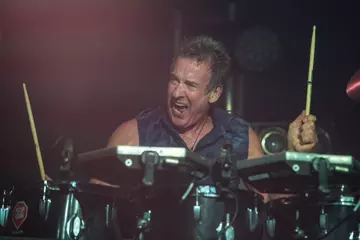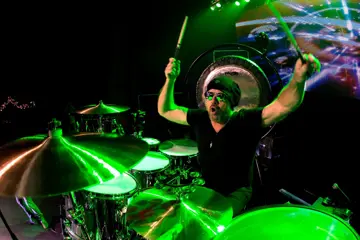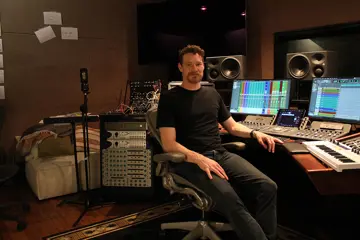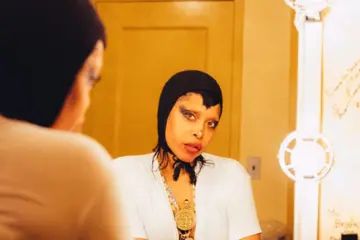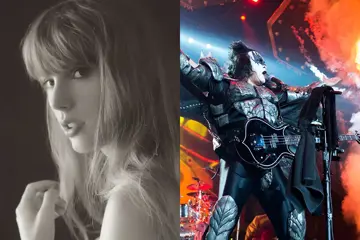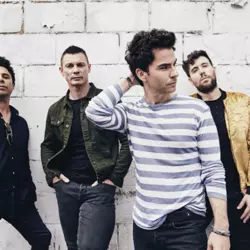 Stereophonics
StereophonicsThe 21-year history of Welsh rockers Stereophonics has seen them graduate from a pub-based covers act to one of the UK's premier bands, regularly selling out huge stadiums. Their 1997 release Word Gets Around was as joyous a debut as you will ever hear, as three young lads, who'd known each other since childhood, belted out raw rock with the sort of epic choruses that matched any of their more established peers. Throughout their time the band have seen their sound evolve and frontman Kelly Jones believes their latest album, this year's Graffiti On The Train, is their most complete (it's certainly their most grandiose in arrangements) yet. Despite his satisfaction with it though, Jones admits his most memorable moments with the band remain the early days: “I think the best time is when you get your record deal and it's all just so exciting. You don't really know what's going on and you're meeting all these other bands that you've been playing covers of in a pub just six months before!” he recalls. “I remember the three of us travelling around the world and we took all our mates as members of the crew and just had a ball. There was a lot of writing being done on buses and hotels but there was also a lot of drinking and a lot of messing around going on as well. So they were good times!”
Their first album became even more successful after the follow up Performance And Cocktails (1999) “went crazy on MTV and the radio,” as Jones puts it. Even at that time though, despite the hits and the obvious temptation, he was determined to see the band's music develop and to always do something a bit different. “For me as a writer and us as a band, we never really want to repeat one album,” he explains. “What we have now is eight albums and each album is quite different from any other. It's what keeps us excited really. I think if we ever feel that we're repeating something in the studio we don't really feel like we're challenging ourselves.”
Following their first, they have always kept album releases pretty regular, very much riding the album-tour-album roundabout. “I think we've always been the type of band that never wanted the band name to get out of sight so we were always very routine,” Jones admits. “Every eighteen months or so there was a new record and then we were back on the road because we never wanted our band to disappear, because so many other bands did.”
According to Jones, it was actually a revelation while touring their greatest hits album (Decade in the Sun: Best of Stereophonics)in 2008 that finally persuaded them that they would be able to pause awhile and take longer than usual to record an album. “I think when the greatest hits did so well we realised how much people were into our band and that gave us confidence in ourselves to go, 'Do you know what, maybe we can take a little bit more time over this than we thought we could'. We didn't really give ourselves longer than six weeks to make a record in the past.”
Don't miss a beat with our FREE daily newsletter
The decision to allow some extra time for the new album therefore meant that they could work on some ideas that had actually been around and grown for a number of years. He explains: “It was the first time we ever went to work not worrying about the clock ticking or a deadline and it just felt good. It gave songs time to breathe, songs could be worked on for a few hours one day and not looked at for a few months before coming back to it. That's how they develop from a forty-nine second clip on your dictaphone to an epic with a thirty-six piece orchestra! I think that's what you get from giving yourself a little bit more breathing space really and we'd never done that before. I had about forty or fifty ideas on cassettes, phones, computers and purposely didn't finish them because I wanted to see which left turns they would take and what production ideas would happen, or if somebody would just play a weird part and we'd see where that would lead. I learned a lot from this record and I would definitely consider doing things that way again.”
Their previous albums have always carried a storytelling approach, but Graffiti On The Train takes that even further. Jones believes that's down to the band's constant desire to try and create some sort of filmic atmosphere in their music, and they were just better placed musically to do that than ever before. Overall it is also a darker album than previous offerings. The inevitable thought is that the sudden and tragic death of drummer and co-founding member Stuart Cable in 2010, who Jones fired from the band seven years previously though later patched up a renewed friendship, had a big influence. Jones denies that affected his writing though: “I don't think it's a result of anything that's happened. Myself and Stuart were mates again for years and speaking right up until the day before he died. The British tabloids put a headline out about regret but it's never come from my mouth, there wasn't any regret, like I say, we were mates apart from the first year when we split up really. But no, it was that the album was written at the same time as a screenplay I was writing about these kids who wanted to escape a small town. I actually think it's quite a hopeful and spiritual record because even though there are some turbulent times in parts of the songs I think most of them come out the other end in an uplifting way.”
Now that the band have jumped back into the system and are touring the album, Jones is relishing being able to pick and choose from eight quite different albums in their live set. The way that the new album has blended in so well and has been so well received seems to surprise him though: “What's been amazing for us on the first leg of this tour is seeing how eight or nine songs from Graffiti On The Train mix so well with all the other records, they just work together,” he says. The fact that a couple of the new songs, the title track and the stirring Indian Summer, have been on the radio so much in the UK that they've become almost as anthemic as their classic Local Boy In The Photograph is the biggest surprise, and relief, though. As he concludes: “That is so encouraging for us. We didn't think we had a single on this album and it's turned out to be one of the biggest air play records we've ever had. Which just goes to show I know fuck all!”


